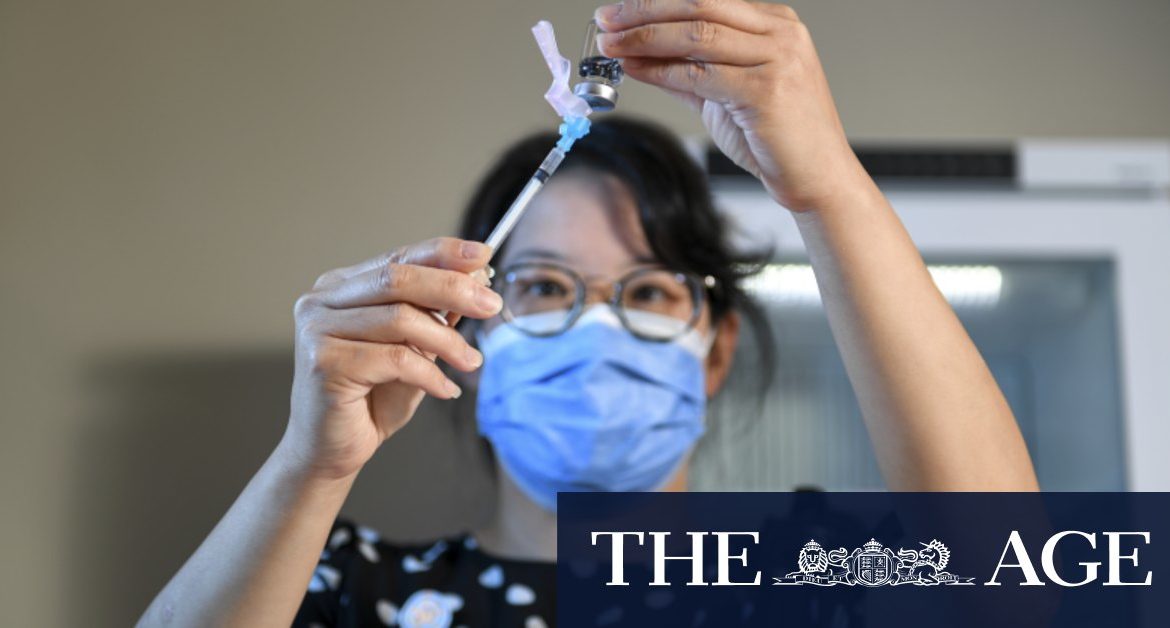“Everyone’s been preparing for quite some time, so I think [there’s a general sense of] excitement that it’s finally here,” said Dr Tong, The Alfred’s deputy director of pharmacy.
Loading
“We’ve been simulating everything from when the vaccine arrives to loading it into the freezer … so the end-to-end process, including reconstituting with vials of saline, drawing up, labelling, and there’s been full simulation in our [vaccination] clinic space as well that the pharmacists have been involved in and how that will run.”
The Pfizer vaccine is the first to be rolled out in Australia, but it poses significant logistical challenges – and with the liquid gold in short supply, healthcare providers are loath to waste any doses.
Vials of Pfizer’s vaccine must be kept at minus 70 degrees, and its handling is a time-sensitive process.
Staff have only five minutes between opening the lids of the “thermal shippers” filled with the vaccine and storing the vials in the ultra-cold freezers. Removing the vials needed for that day must be done within three minutes.
“It needs to be very precise to ensure there are no temperature breaches,” Dr Tong said.
Her team at The Alfred has been timing every step of the process; at first they were relying on their phones but now they have a stopwatch attached to the ultra-cold freezer.
The vaccines will be prepared in the pharmacy department on the lower ground floor, where staff will “reconstitute” the vaccine by adding saline to vials, draw 0.3 millilitres into the syringes and then take them up to the vaccination clinic on the ground floor for nurses to administer jabs.
When the Pfizer vaccine is prepared, it cannot be taken away in a motor vehicle. So vials will be delivered to hotels housing returned travellers, where pharmacists on site will go through the process of reconstituting the vials and drawing the liquid for nurses to inoculate people.
Loading
Each vial has about five doses, and pharmacists need to ensure they are preparing the right number of doses needed for that day to prevent wastage, Dr Tong says. Once the vials are thawed, they can stay in the fridge for about five days only.
It’s a logistical nightmare and every hospital has been desperately working behind the scenes to ensure the mass vaccination program is rolled out smoothly.
Monash Health’s director of infection control, Rhonda Stuart, will be among the first Victorians vaccinated from 7.30am on Monday, along with 100 Monash Health staff working directly with coronavirus-positive patients.
Professor Stuart says her organisation has been preparing for this moment since about Christmas, when it was told it could become a vaccine hub.
Unlike the regular flu vaccination program, in which people wait in line for their turns, the process for the COVID-19 jab will be more regimented. Professor Stuart said people receiving their first dose needed to be booked into the clinic, complete their paperwork in a dedicated room, head to the clinic where the vaccines are being administered, then wait for 15 minutes in another room.
“We hopefully will begin to see COVID in a different way,” she said. “It’s not going to go away, we need to be clear about that, but we can begin to manage it in a different way, and hopefully it will become like the common cold.”
Dr Sumi Bhaskaran, from Monash Health, will be among the first Victorians vaccinated.Credit:Penny Stephens
The head of Monash Health’s general medicine unit, Sumi Bhaskaran, will get the jab on Monday and says Australia has come a long way since last year, when footage of Italian and American hospitals overrun with coronavirus patients hit our screens.
“Thinking about the last 12 months, I divide myself into three stages,” Dr Bhaskaran said. “The first stage is around this time last year when we started seeing reports from overseas about hospitals being overrun, and we hadn’t started really experiencing any of that … from a personal point of view that caused a lot of anxiety.
“And then as the head of the unit my thinking very quickly changed to my staff and how do I make sure we protect our staff to minimise exposure.
“And then we realised the challenges of having to manage patients in an environment where we have to isolate them, and we’re dressed in personal protective equipment … and making sure we’re looking after everyone’s wellbeing and mental health as well.”
Get our Coronavirus Update newsletter
Stay across the news you need to know related to the pandemic. Sent Monday and Thursday. Sign up here.
Sumeyya is a state political reporter for The Age.
Most Viewed in National
Loading







